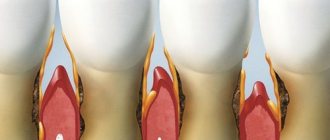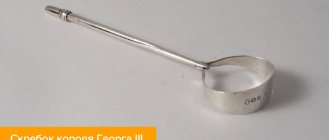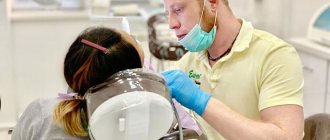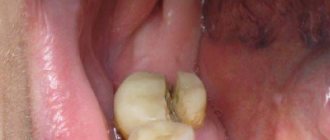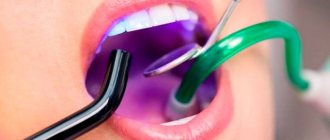Normally, a child should not experience bad breath. If your child has bad breath and a cough, this is a reason to visit a doctor. In the presence of snot or cough, a large number of pathogenic microorganisms develop in the nasopharynx and oropharynx. They cause the stench. It is important to carry out treatment on time in order not only to get rid of the unpleasant symptom, but also to prevent the development of various complications.
Bad breath as a symptom of a baby’s illness
Bad breath in a child that occurs due to illness should not be ignored. All pathological processes in the body that cause an unpleasant odor are conventionally divided into three main categories:
- Inflammatory and infectious processes in the oral cavity. This category includes all diseases - caries, gingivitis, periodontitis and other problems.
- The cause of bad breath in a child is often diseases of the upper respiratory system. Such pathological processes are caused by an inflammatory process in the nasopharynx or oropharynx. Against this background, the walls of the bronchi thicken and the amount of mucus produced increases. Along with the secretion of sputum, a stench appears.
- Pathologies of a systemic nature. This category includes diseases such as diabetes mellitus, disorders of the kidneys, liver, and digestive system.
Along with an acute respiratory viral process, halitosis also occurs in the child’s body, since acute respiratory infections or acute respiratory viral infections are almost always accompanied by the activation and proliferation of pathogenic microorganisms. They are the source of bad breath. If a cough begins to be accompanied by an unpleasant odor, this may indicate phlegm accumulated in the bronchi or lungs.
The same symptom appears in a newborn with fever and developing sore throat, acute tonsillitis. In cases of sore throat and acute tonsillitis, the cause of bad breath in a child is plaque. In advanced forms of the disease or in lacunar tonsillitis, the plaque has a purulent odor.
Along with infections in the nasopharynx or sinuses, a foul odor also appears. If such a sign appears, you should visit a doctor, determine the cause, and begin treatment.
Diagnostic measures
Diagnostics is prescribed by a doctor after an external examination and collection of anamnestic data. If diabetes is suspected, appropriate tests are prescribed (for sugar, hormone levels, resistance to glucose tolerance, ultrasound examination of the pancreas and thyroid gland).
If the doctor suspects diseases of the digestive system or liver, an ultrasound examination of the abdominal organs and biochemical blood tests are prescribed. An examination by a dentist or otolaryngologist is also scheduled. Treatment is prescribed only after the disease is detected.
What causes an unpleasant odor?
If your breath smells bad, there can be many reasons. Often some disease of the ENT organs is the source of such a symptom. The air that a sick child exhales with a cold is saturated with volatile molecules. These compounds are formed during the development of a purulent process and during infectious tissue breakdown. Among the diseases that are accompanied by the appearance of halitosis are: sinusitis, tonsillitis, bronchiectasis, abscess and gangrene of the lungs.
During the development of sinusitis, cough is a consequence of the flow of sputum along the back wall of the oropharynx. And with tonsillitis, pharyngitis often appears, during which irritation of the mucous membrane of the throat occurs. With the development of bronchopulmonary disease, a cough appears due to the accumulation of mucus in the organs of the upper respiratory system, from which the body tries to cleanse itself.
Finding the source that causes the odor is possible only after an examination. One of the very first methods that allows you to make a primary diagnosis is a medical examination.
Clinical manifestations of diseases
Diseases that are accompanied by the presence of odor have different symptoms, based on which the doctor can make a diagnosis.
Sinusitis
When pus accumulates in the paranasal sinuses, the child develops a foul odor from the mouth. This disease is accompanied by the following symptoms:
- swelling of the nasopharynx;
- green snot mixed with blood and mucus;
- deterioration in the quality of smell;
- high temperature (if the temperature is above 38 C, this indicates an advanced form of the disease);
- a feeling of squeezing and pain in the upper jaw.
During an acute inflammatory process, body temperature rises, this is accompanied by general intoxication of the body. The fact that complications are developing is indicated by redness and swelling of the epidermis on the outside. It is very important to prescribe the correct treatment, since during the inflammatory and infectious process, bacteria actively multiply, which often causes bad breath.
Tonsillitis
With a prolonged inflammatory process, intense accumulation of pus occurs in the lacunae of the tonsils. Foul-smelling mucus consists of a mixture of dead microbes, leukocytes and dead epithelium. In addition to halitosis, tonsillitis is accompanied by the following symptoms:
- sore throat when eating and swallowing saliva;
- bouts of dry cough;
- swelling of the pharynx, swelling of the oral mucosa at the root of the tongue;
- coating on the tongue;
- increased sweating;
- increased weakness and fatigue.
With the further development of the pathological process, the temperature rises, this is accompanied by general intoxication of the body. It is important to carry out timely treatment of tonsillitis to prevent the development of possible complications. After the treatment, the unpleasant odor will disappear on its own.
Bronchitis
This disease is characterized by dilation of the bronchi and swelling of the mucous membrane, thickening of the walls, and accumulation of viscous sputum. This secretion is also the cause of halitosis. When bacteria actively multiply during bronchitis, due to an imbalance in the microflora, such a symptom appears. Other signs that bronchitis is developing include:
- dyspnea;
- wheezing in the chest;
- frequent coughing attacks (dry or wet, depending on the degree of the disease);
- possible increase in body temperature;
- pale skin;
- increased sweating.
As bronchitis progresses, the mucus thins and becomes easier to cough up. An unpleasant odor accompanies the entire period of disease development and treatment.
Abscess or gangrene of the lungs
Another cause of a foul smell when coughing is an abscess or gangrene of the lungs. These diseases are characterized by the destruction of alveolar tissue. Due to such reasons, during the development of pathology in the lung, a decay cavity is formed, which is surrounded by granulation and fibrous tissue. As the abscess matures, the following symptoms appear:
- bouts of dry, frequent cough;
- dyspnea;
- pain in the chest;
- weakness;
- very high body temperature;
- headache.
If alarming symptoms appear, you need to go to the doctor as soon as possible, since only a specialist can choose the correct and timely treatment. The listed symptoms can also appear with pneumonia, but only with pneumonia there is usually no noticeable odor.
With the development of gangrene of the lung, severe intoxication of the body occurs. Necrosis with multiple decay cavities forms in the tissues. When local and general symptoms become more pronounced, sputum begins to flow intensively. It has a distinct foul odor.
What should parents do?
If a child develops halitosis from the mouth due to a runny nose, tonsillitis or other diseases of the upper respiratory system, parents must respond in time. It is important to visit a specialist as soon as possible. To get rid of the unpleasant odor and accompanying symptoms of tonsillitis or other diseases, the doctor will conduct an examination,, if necessary, prescribe additional diagnostic measures, after which a competent treatment regimen will be drawn up.
If bad breath appears during a sore throat, this indicates that the disease is advanced and that purulent contents accumulate in the lacunae of the tonsils. The treatment regimen for tonsillitis in children in many cases includes antibiotics for children. You should not treat the disease yourself, especially using only traditional medicine methods. Only a doctor can prescribe the correct algorithm for dealing with snot and sore throat. Once the mouth and throat problems are cured, the problem of bad breath will go away on its own.
With rhinitis (runny nose), the appearance of aroma is due to the accumulation of a large amount of mucus in the nasopharynx. If your breath smells bad, the nasal mucosa is swollen, it’s difficult to breathe, you don’t need to immediately drip vasoconstrictor drugs. Before the doctor arrives, it is recommended to only rinse your nose with saline solution. Further treatment is prescribed by the doctor. Especially when it comes to a small child.
Diagnosis and treatment
If you notice such a symptom, first of all, you need to contact your pediatrician. After an initial examination and medical history, the specialist may prescribe the patient a test for acetone levels, an ultrasound of the abdominal cavity, and general blood and urine tests. Only when the root cause of the disease is identified, the doctor will be able to select the correct treatment.
Important! When acetone levels are critically high, children experience a sharp increase in the level of toxins in the body, as well as dehydration. If treatment for this condition is not started in time, there is a risk of death of the child.
The smell of vinegar from the mouth requires the following therapeutic measures to eliminate it:
- The child should be given plenty of fluids, but you should not force him to eat. When an appetite appears, it is better to give your baby an apple or vegetable puree.
- Prescription of drugs to remove toxins (Atoxide).
- Prescription of drugs to restore acid balance (Regidron).
Regidron is prescribed to restore the acid balance in the body.
Important! Self-medication in this condition is strictly prohibited. All your actions must be coordinated with your doctor.
How can the doctor help?
The cause of bad breath can be determined after a thorough examination. If a bad smell appears along with the cough, or the baby has a sore throat, antiviral drugs, antibacterial agents, antiseptic sprays, and special lozenges are usually prescribed. If it hurts to swallow, or your breath stinks, you can also gargle the red throat additionally, lubricate it with antiseptic solutions, Lugol.
If a child has a stuffy nose, rinsing with saline solutions is prescribed; in case of severe nasal congestion, vasoconstrictor drugs are prescribed.
For more complex forms of diseases of the upper respiratory system, hospitalization is indicated. For bronchitis that occurs in a mild form, you can be treated at home, only by strictly following all medical prescriptions.
ethnoscience
If your baby’s mouth stinks, folk remedies will help. A rinse decoction prepared from medicinal plants will help: chamomile, oak bark, mint, sage. Using a decoction, rinsing procedures are carried out, thanks to which the problem is eliminated for a while.
You can also rinse with lemon juice, tea tree oil, a decoction of verbena stems, an infusion of strawberry leaves, and sorrel.
How to get rid of bad breath with colds
If a coughing child complains of a sore throat or his nose begins to get stuffy, this is a reason to consult a doctor. To prevent complications after acute respiratory viral diseases, timely treatment should be started. You can also temporarily mask halitosis during a cold with the help of refreshing sprays, lozenges, and rinses.
After recovery, halitosis in children will go away on its own. You just need to follow all the recommendations of experts.
Psychosomatics as one of the reasons
Such symptoms may be caused by psychosomatic factors. In this case, these are not signs of the disease. There is such a thing as false halitosis. This disease, which relates to mental disorders, is more often diagnosed in adults. Moms and dads who worry excessively about their child's health may not notice how this intense anxiety transforms into real mania. Adults think that the child smells unpleasant. In an effort to help the baby, they take many activities.
So a non-existent disease becomes a problem, and the child is constantly in a state of stress. In this case, halitosis is only a cause for concern for parents, and not a true symptom of possible pathologies. Parents should listen to the doctor’s recommendations and follow all instructions. Typically, treatment of halitosis in this case is carried out by a neurologist or psychiatrist, working in parallel with both the child and his parents.
Prevention of the problem
To prevent the child from developing an odor, to prevent oral problems in children, it is recommended to adhere to the following preventive measures:
- Adjust your diet, include more fresh fruits, vegetables, and dairy products.
- Temper the child with walks in the fresh air, frequent ventilation of the room, and water procedures.
- Observe the drinking regime; the child should drink about one and a half liters of clean water, especially in the heat.
- To ensure the full health of the baby, it is necessary to consult a doctor on time and undergo regular preventive examinations.
Oral hygiene should be performed from the time the first tooth appears. Initially, parents should carefully remove the plaque using gauze wrapped around their finger. As your baby grows, you need to purchase special toothpaste and a baby brush. Teach him how to use hygiene products and ensure that the procedure for cleaning his teeth and tongue is carried out thoroughly. If necessary, during the cold and flu season, take immunostimulants and multivitamin complexes prescribed by your doctor.
Chief author and editor-in-chief: Makarskaya S.E., 29 years of experience.
Last revision: 02/10/2018
Oral care
The rules of oral hygiene are simple, do not require any effort, are easy to remember, and easy to follow regularly. It is imperative that you pay proper attention to your health.
Some useful hygiene tips:
- Brush your teeth 2 times a day, morning and evening. During the day, a lot of bacteria accumulate in the mouth; it is advisable to get rid of them before going to bed.
- Brushing your teeth should take at least 3 minutes.
- The brush needs to be changed at least once every 3 months.
- Toothpaste is selected individually, taking into account the condition of the gums and teeth, starting with oral diseases. There is no need to skimp on this.
- Your tongue, gums and cheeks require proper care, and it's best to go beyond just brushing your teeth.
- You need to use modern care products after every meal. These include all kinds of mouthwashes and dental floss.
- A visit to the dentist should be made once every six months.



